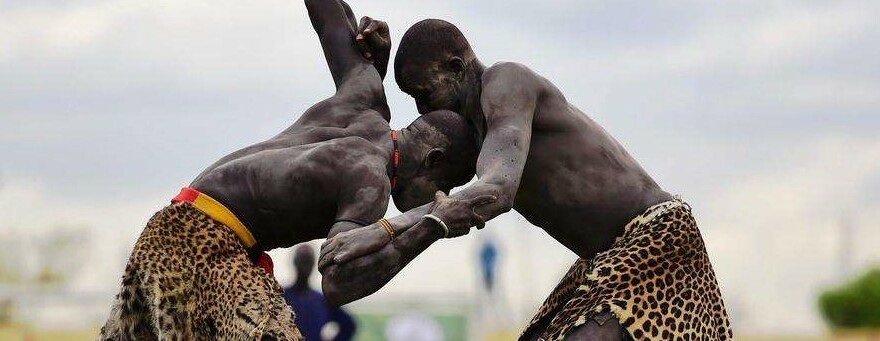A group of men in the Jonglei State capital, Bor town, is using wrestling to harness peace among the communities in the state and beyond.
Traditional wrestling, a hugely popular sport in the world’s youngest nation, is widely practised among the communities for friendly competition for entertainment purposes.
But now, a group of traditional wrestlers—the Jonglei Wrestling Association — said they would use the sport to restore peace in the troubled Jonglei.
Radio Tamazuj caught up with the group’s head, Majok Jokriir, who said peace can be achieved because wrestling is popular among youth who he said are the perpetrators of violence.
Majok, a 1994 Greater Bor wrestling champion, assumed the leadership position a week ago.
Below are edited excerpts:
Q: Briefly, tell us about your wrestling group.
A: The Jonglei Wrestling Association was formed in 2010 after we separated from the rest of Sudan. But traditionally, it has been there where we engaged our neighbours Mundari of Juba and Aliap in Lakes State.
Q: Are you only in Bor or the whole Jonglei?
A: For now, we are in Bor County, Twic East County, and Duk County, where wrestling is part of the culture. Our Nuer brothers neighbouring Duk are also learning. If the situation allows, we plan to diversify wrestling across Jonglei and the rest of the country.
Q: What do you think are the benefits of wrestling?
A: Wrestling brings people together. That is what we call peace. I am from Bor. There will be no way I fight a friend from Duk who is my colleague. Again, it brings peace, and in it, we are exposed to ladies from other communities. We end up in marriage, and that is already social interaction. For example, we have nephews and nieces from Mundari of Central Equatoria State and the same thing for Mundari. This is because of wrestling.
Also, wrestling keeps youth engaged. This way, there will be no room for anyone to think of attacking others.
Q: For you personally, has wrestling changed your life?
A: I started wrestling when I was a teenager. And in 1994, I became the champion of Bor. I carried out the exercise until I retired from a wrestling competition in 2014. Wrestling has changed my life. Now, I am famous in the whole country and have built a lot of friendships.
Q: How did wrestling start in Bor?
A: According to what we heard from our elders, wrestling started around 1913 and 1914. It first started with kids while they were just playing. The adults then adapted it, and that’s why it became part of the culture. In the 1990s, it was introduced to Mundari after we migrated there with our cattle. The same for the Aliap community; they learnt from us. From Aliap, it moved to Rumbek.
Q: What is your plan to promote this traditional wrestling nationally or internationally?
A: We are engaging our sports ministry so that wrestling is recognized as a national game. We need a wrestling academy so that we can go around teaching all the communities in the country. It is so easy to learn.
Q: In the beginning, you emphasized that wrestling brings peace, but we have also seen how sometimes it ends up in violence. How do you mitigate such violence?
A: In our culture, if somebody dies during wrestling, there is no fight or compensation. Only one cow will be demanded as blood compensation.
Also, as we speak, we have drafted a bill pending government approval. I hope that next month we will have a law to regulate wrestling.
Q: What is your final message?
A: My message is that let us embrace wrestling as the South Sudanese. Wrestling brings peace by bringing youth together and through intermarriages.




